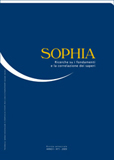Sophia Review
year I, n. 2, July-December 2009
ROSSÉ, Gérard. Lo Spirito di Gesù: Spirito di verità e comunione
The New Testament shows that opening up to faith and receiving baptism, that is, the beginning of Christian life, were lived as a powerful experience of the Holy Spirit. This was not only or essentially accompanied by extraordinary phenomena such as speaking in tongues, but more profoundly was an indelible moment of light and love that transformed a person’s entire previous existence and left a memory that marked the rest of that person’s life. The author reminds us that this experience remains essential for believers still today, even though it no longer happens normally at the moment of baptism since this takes place in infancy.
>Go to the article
CODA, Piero. Per un’ontologia trinitaria della persona
The article examines the development of the concept of person so as to offer new perspectives and keys of interpretation for an ontology of the person in the light of Christological revelation. The hermeneutical circle between the theological and the anthropological meanings of the concept of person has its nucleus in Jesus Christ, true God and true man. Contemporary understanding introduces the categories of intersubjectivity and communion, which allow for a re-reading of the metaphysics of being as a metaphysics of agápe in the light of Christ. In fact, it is necessary to look to the paschal event of his death/resurrection in order to penetrate the ontological-trinitarian meaning of the Agápe that God is, in the infinite and reciprocal self-giving of the Father, of the Son and of the Holy Spirit. The self-giving of created persons, who have their being from God, cannot occur ontologically, but intentionally, that is, on the level of knowing and loving. In the creature, being and agápe do not coincide: only God “is” Agápe; but in Jesus Christ, freely received and lived by grace, the created person shares in the reality of filial trinitarian agápe. The presence of the risen Christ among those who believe in His name (cf. Mt 18:20), engrafted in Him by faith, is an ontological presence that is constitutive of the definition of the human person in relation to God and to others in Christ.
>Go to the article
PELLI, Anna. Il darsi della verità nell’amore: prime riflessioni sul conoscere come comunione
The question of truth is philosophy’s original and basic theme. From an anthropological perspective it has always been one of the most fundamental and significant interrogatives. This is still the case in today’s world, when the very idea of truth appears to have been internally corroded by the wide-spread feeling of the fragility of all knowledge. Beginning with the original Greek meaning of truth, the article examines a ‘twofold modality’ of knowing. It then outlines a further way of knowing based on love as its original paradigm. This gives the human search for truth a character that is intrinsically intersubjective and communitarian and that finds its expression in dialogue.
>Go to the article
POVILUS, Judith. Laws of thought and patterns of love
The concepts of “gift” and “logic of gift” as they appear in the Encyclical Caritas in veritate open the way to a further analysis of the category of relation. The author develops the theme first from the perspective of philosophical logic with particular reference to the book by Pierre-Jean Labarrière, “Au fondement de l’éthique. Autostance et relation”, and subsequently from the viewpoint of formal ontology, showing that an adequate formal system of dynamic relations, inspired by the Trinity, can provide an appropriate model for the “dynamic of charity received and given”. Since this formal dynamic pattern is also applicable to the Encyclical’s description of truth, the basic underlying logic of truth and of gift of self appears to be the same.
>Go to the article
LEAHY, Brendan. Ecclesiology in the light of Vatican II’s Trinitarian Anthropology
Fifty years have passed since the openingof the Second Vatican Council, an event that invited the Church to rediscover the Church itself as an icon of Trinitarian life. In this article the author reflects on how the Council also points the way for ecclesiology to review its own method and themes by drawing upon the Trinitarian anthropology that the Council outlines. What this article proposes is that in finding its “place” in the agape of the Christ event, the Church is to be explored in terms of its intrinsic relation to human society. On this basis significant themes are suggested as important for consideratio by those constructing and communicating ecclesiology.
>Go to the article



